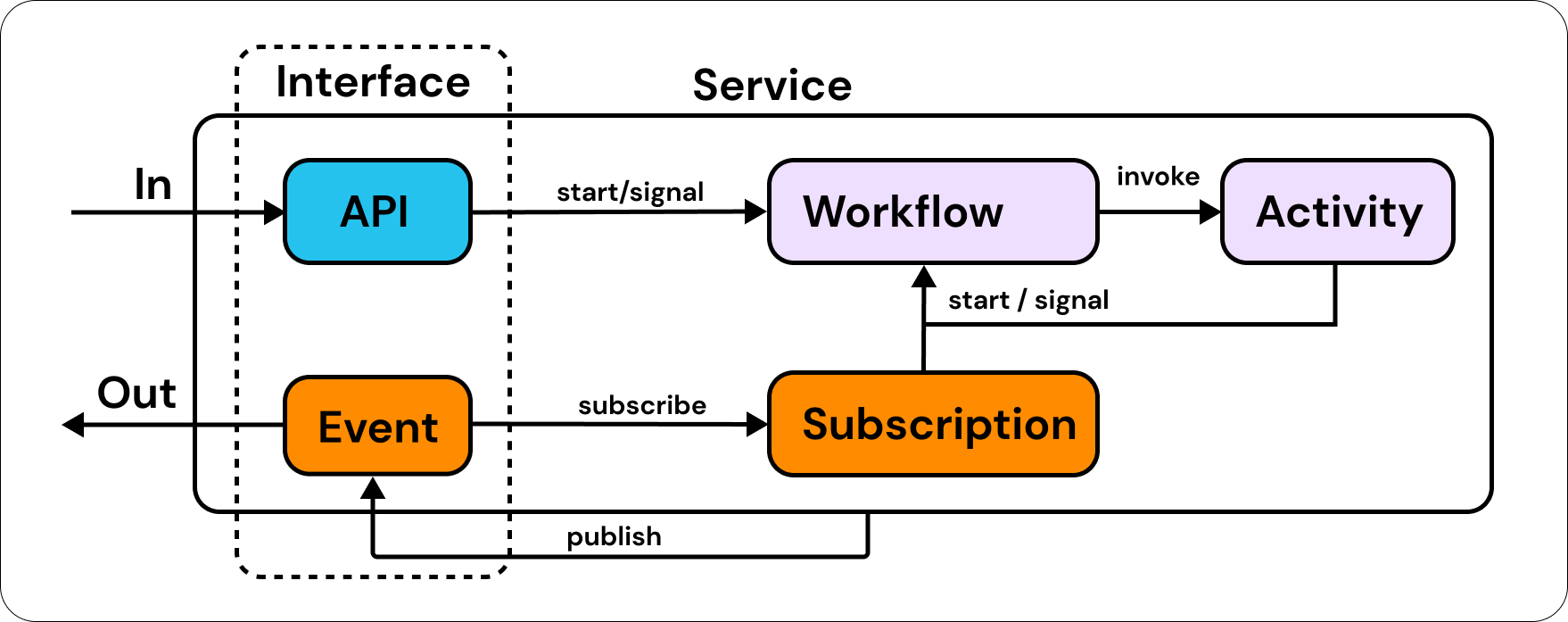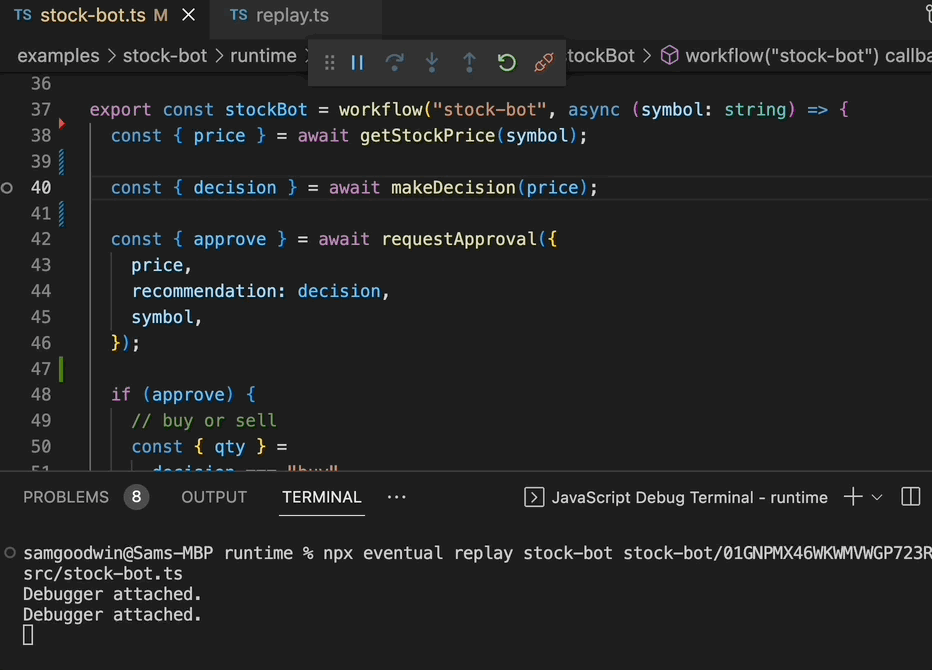What is Eventual?
Eventual is a Software Development Kit (SDK) for building micro-services in AWS using pure TypeScript and modern Infrastructure-as-Code (IaC) such as the AWS CDK, SST, Pulumi and Terraform (coming soon!).
Stay tuned for an introductory video
Service
The top-level Concept of Eventual is a Service consisting of APIs, Events, Subscriptions, Workflows and Tasks.

Construct
Each of these pieces are discovered and deployed with Service Construct in an AWS CDK or Pulumi application.
new Service(this, "invoice-service", {
entry: require.resolve("@invoicing/service"),
});
Command (RPC)
A Command is a Remote Procedure Call - a Function that can be called over HTTP.
export const sendInvoice = command("sendInvoice", async (invoice: Invoice) => {
await invoiceDB.putItem(item);
});
HTTP
Commands are an opinionated RPC interface that streamline the development of APIs. In some case, you need access to the raw HTTP protocol.
For this, Eventual integrates with itty-router to provide a bare-bones HTTP router with the Node Fetch types.
api.get("/hello", async (request) => {
return new Response("OK");
});
Middleware
Middleware chains perform functions such as validating requests, setting headers, authorizing and fetching user information for Commands and HTTP routes.
export const hello = api
.use(cors)
.use(authorized)
.command("hello", async (name: string, { user }) => {
// etc.
});
Workflows
Workflows are the powerhouse of Eventual. With them, you can build long-running, fault tolerant processes with the expressivity and flexibility of ordinary imperative code.
const processOrderWorkflow = workflow("order", async (order: Order) => {
const charge = await chargeCreditCard(order.source, order.amount);
try {
await dispatchOrder(order);
} catch {
await chargeBack(charge.chargeId);
}
});
This may look like a typical function but it's actually a workflow that can span days, months or even years without failure.
Workflows provide runtime guarantees that can't be ordinarily achieved within APIs, Event Handlers or Tasks. They are the glue that coordinates time, people and services in a reliable, predictable manor.
Task
An Task is a logical unit of work that can be called from a workflow. Workflows do the orchestration while Tasks perform the actual work.
For example, a function to integrate with Stripe to charge Credit Cards:
const chargeCreditCard = task(
"chargeCC",
async (source: string, amount: number) => {
await stripe.charges.create({
amount,
source,
currency: "usd",
});
}
);
Signal
Services live in the real world where information is constantly flowing and changing. You can use Signals to send information into a running workflow and change its course, for example to cancel an order that is inflight.
const cancelSignal = signal("cancel");
const processOrder = workflow("processOrder", async (order: Order) => {
cancelSignal.onSignal(async () => {
await cancelOrder(order);
});
});
Signals can be sent from anywhere within an Eventual application, for example an API:
api.post("/order/:orderId/cancel", async (request) => {
await cancelSignal.sendSignal({
executionId: request.params.orderId,
});
});
Event
Events are records of something that has occurred (for example a change in the state of data within a Service) that other components and services listen to.
First, you define an "Event Schema":
const orderEvent = event<{ orderId: string }>("Order");
Emit
Then you can emit to it.
await orderEvent.emit({
orderId,
orderTime,
});
You can emit an event from APIs, Event Handlers, Workflows and Tasks, or even from outside Eventual.
Subscription
Or subscribe to it:
export const onOrderEvent = subscription(
"onOrderEvent",
{
events: [orderEvent],
},
async (event) => {
// process order event
}
);
Cross-Service Subscription
And route them to other Services:
invoiceService.subscribe({
service: orderService,
events: ["OrderEvent"],
});
Testing
Unit Testing
Eventual's Unit Testing library includes a TestEnvironment utility that gives fine-grained control over time and the underlying system, so that you can target tests towards edge cases typically difficult to reproduce consistently in integration tests.
// advance the simulation's time
await env.tick();
// check the status of a running workflow has changed to SUCCESS
expect(await execution.getStatus()).toMatchObject({
status: ExecutionStatus.SUCCESS,
});
Local Simulation
Eventual's dev server simulates your Service locally, so you can quickly iterate on the business logic without deploying back and forth from the cloud.
eventual dev
Once started, you can observe how Commands, Workflows, Tasks and Subscriptions behave within the context of a single Node Runtime for easy debugging in your IDE.
Time Machine Debugging
Debugging distributed systems in the cloud is a near impossible task. Eventual's Time Machine Debugging feature allows you to replay a workflow execution that has already run (or is still running) locally within your IDE and debugger.
Step through time and observe what actually happened, identify and fix the bug, add a test and push for victory!

Project Structure
Eventual creates a mono-repo set up.
├──infra/
├──packages/
├────service/
├──package.json
├──tsconfig.base.json
├──tsconfig.json
These are pretty common these days because, with just an extra bit of configuration, you can maintain and develop on multiple NPM packages together. This is particularly important when building in the cloud, as you may have multiple different (but related) projects, e.g. a Next.JS frontend, 1 or more Services and a CDK/Pulumi application for your infrastructure.
Drop-in
Eventual can be dropped into existing applications. For example, SST 2.0 also adopts a mono-repo setup, making it straightforward to integrate Eventual into SST.
End to End Type-Safety
Eventual really goes the extra mile when it comes to “end-to-end type safety”.
ServiceClient (frontend → backend)
The ServiceClient provides a type-safe client for your Service without any code generation. Simply import the types of your backend code and instantiate the client.
import type * as Invoicing from "@@invoicing/service";
const client = new ServiceClient<typeof Invoicing>({
serviceUrl: process.env.SERVICE_URL!,
});
await client.sendInvoice({ .. });
Service (backend → infrastructure)
The same goes for when you’re configuring infrastructure.
import type * as MyService from "@my/service";
const service = new Service<typeof MyService>(this, "Service", {
commands: {
// safely configure any of the commands
hello: {
environment: { .. }
}
},
tasks: ..
subscriptions: ..
});
Eventual CLI
The Eventual CLI provides tools for local development and interacting with live Services.
You can perform tasks such as start workflows, check their status, get a service's endpoints, etc.
See the Eventual CLI docs for more information.
